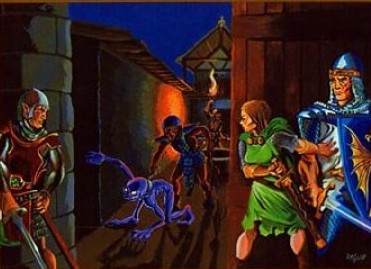
SURPRISE

| Players Handbook | - | - | - | AD&&D |
| Surprise (DMG) | Surprise (Dragon) | - | - | - |
Surprise is simply the unexpected,
unprepared for.
Characters can be surprised
just as creatures they encounter can.
Noise && light
can negate chances for surprise with respect to characters or creatures
they encounter.
Surprise is usually expressed
as a 2 in 6 chance for all parties concerned,
i.e. a six-sided die is
rolled with a 1 or 2 indicating surprise.
Some monsters are more capable
of surprising foes than the normal 2 in 6 probability,
and some cannot be surprised
as easily, so they have a reduced probability --
1 in 6, 1 in 8, etc. <(In
this case, convert the surprise numbers to percentages. 1 in 6 = 16.66,
2 in 6 = 33.33, 3 in 6 = 50, 4 in 6 = 66.66, etc.>
Each 1 of surprise equals
1 segment (six seconds) of time lost to the surprised
party,
and during the lost time
the surprising party can freely act to escape or attack or whatever.
If both parties are surprised,
then the effect is negated or reduced:
| Surprise Dice Difference | Lost Segments |
| 0 | 0 |
| 1 (2-1, 3-2, etc.) | 1 |
| 2 (3-1, 4-2, etc.) | 2 |
| 3 (4-1, 5-2, etc.) | 3 |
Assume the party of characters,
moving silently and invisibly, comes upon a monster.
They have 4 of 6 chances
to surprise, and the monster has 2 in 6.
A six-sided die is rolled
for the party, another for the monster.
Both sides could be surprised,
neither could be surprised, or either could be surprised.
This is shown on the table
below:
| Party's Die | Monster's Die | Surprise Effect |
| 3 to 6 | 5 or 6 | none |
| 1 | 1 | both surprised |
| 2 | 2 | both surprised |
| 1 or 2 | 5 or 6 | party surprised |
| 3 to 6 | 1 to 4 | monster surprised |
| 1 | 2 to 4 | monster surprised |
| 2 | 1 | party surprised |
Noise or light can negate
the chance of surprising a monster.
Similarly, if the party
is aware of a monster, the party cannot be surprised by it unless it is
also aware of them --
in the latter case, it might
be able to hide and ambush the party.
If surprise exists, the surprising
party can use the time segments to flee/escape,
close,
or attack.
Distance of 10' or less
con usually be closed and an attack made in 1 segment.
Physical attacks during
surprise situations are also possible on a 1 per segment basis,
whether the form is by weapon,
projectile, or method intrinsic to the creature (claws, fangs, etc.),
even a breath weapon USE;
magic spells require the proper number of segments of casting time, regardless
of surprise.
See also INITIATIVE hereafter.

ADQ: How do you figure
surprise
between a ranger (surprises
50%) and an
ettin (surprised only 1
in 6)?
ADA: Carefully. If
the surprise roll
(1d6) for normal creatures
encountered
is 1-3, a ranger surprises
them. Compared
to normal (1-2), that means
the
ranger has a +1 bonus. However,
the
ettin has a +1 bonus, too,
from the
other end (1 instead of
1-2), so the two
effects cancel out; a ranger
surprises an
ettin at normal chances
(1-2 on 1d6),
while other characters only
surprise the
monster on a result of 1.
Similar
situations with other creatures
are handled the same way,
converting
everything to modifications
of
the roll. Note that a creature
may be
listed as "never surprised,"
but nothing
ever "always surprises."
(Polyhedron #12)